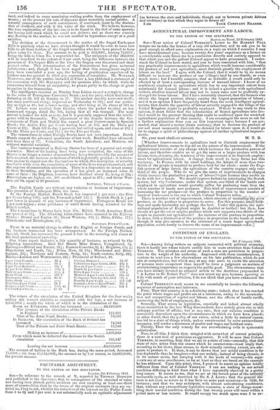AGRICULTURAL IMPROVEMENT AND LABOUR.
TO THE EDITOR OF THE SPECTATOR. . • .• Burton.ou.Trent. 2d February 1843. SIR—Your review of Colonel TORRENS'S Letter to Sir ROBBRT PEEL tempts me to take the licence of a very old subscriber; and to ask you to be good enough to afford some explanation on a topic on which I conceive I may have misunderstood you; because twenty-five years' experience as a farmer on a considerable scale forces me to a conclusion directly and entirely opposed to that which you and the gallant Colonel appear to have pronounced. I under- stand the Colonel to have stated, and you to have concurred with him; " that any practicable improvements in agriculture which would increase considerably the produce of our own agriculture, must diminish greatly the employment of labour on the land." I agree with the Colonel, that it would be by no means difficult to increase the produce of our (tillage) land by one-fourth, or even much more; but I humbly conceive, that so desirable a result could only be effected by at least a corresponding increase of manual labour : I know of no machinery employed in agriculture which has to any important extent been substituted for manual labour ; and it is indeed a question with agricultural writers, whether manual labour may not in many cases now be profitably ex- changed for horse labour. But I have invariably observed, that the farmers who obtain the largest produce always employ the largest proportion of labour ; and it is an opinion 1 have frequently beard from the most intelligent agricul- turists, that double the quantity of labour actually engaged in the tillage of the United Kingdom might be profitably employed. If there be any truth in this opinion, it must follow that the introduction of Scotch agriculture into Ire- land would be the greatest blessing that could be conferred upon the wretched agricultural population of that country. I am encouraged the more to ask for a further explanation from you on this important topic, because I am per- suaded, that should a notion obtain currency, that to increase the produce of our soil must necessarily diminish the demand for labour upon it, it would go far to engage a spirit of philanthropy against all further agricultural improve- ments.
[Whether improvements in agriculture tend to diminish employment for agricultural labour, seems to depend on the nature of the improvement., If the improvement consists of any change which increases the productive powers of labour, and therefore enables us to get the same or a larger produce with less labour, then, of course, the tendency of the improvement is to diminish employ- ment for agricultural labour. A change from small to large farms has this tendency. In France, with its small holdings, the labeler of more than two- thirds of the people is required to produce food_for the ihole : under the Eng- lish system of large farms,. the agriculture of the country engages only one- third of the people. Why do we give the name of.improvements to changes which increase the productive powers of labour ?=-just because theyenable us to do with few :r hands. We should improve behind by introducing the Scotch system, but why ?—because, under that system, one-third of the lhatids now employed in agriculture would probably suffice for producing 'Mora than the whole number of hands now produces. This kind of improvement consists of increasing the net produce—or the produce in proportion 'to the number of hands at work—and is the one to which Colonel TORRENS refers. J.. There is another sort of improvement, which consists of increaAng.thegross produce, or the produce in proportion to acres: , For this purpose, small hold- , ings and spade-husbandry are perhaps the best.' Under thissyitem; the agri- cultural population of .England might be doubled or trebled but then, how should we get the net or surplus produce which now supports two-thirds Of the people in pursuits not agricultural? An increase of the produce in proportion to acres, with a diminution of the produce in proportion to the bands at work, though it may give occasion to the existence of a much larger agricultural population, seems hardly to deserve the name of an improvement.—En.]


























 Previous page
Previous page